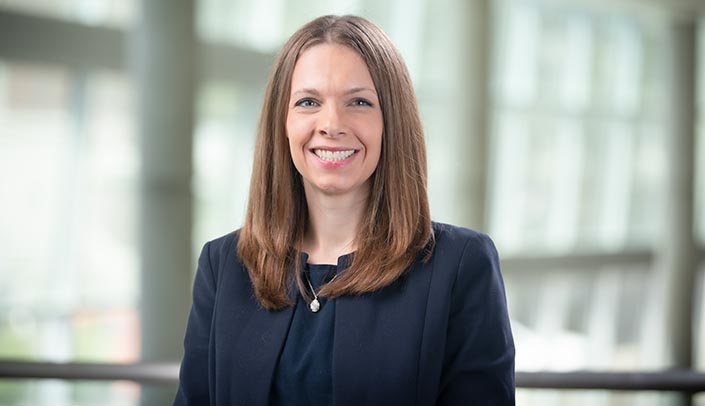Marley Doyle, M.D., assistant professor in the UNMC Department of Psychology, opened up about her visual impairment on a recent episode of the DocsWithDisabilities podcast.
Dr. Doyle is an adult psychiatrist and director of the Behavioral Health Education Centers of Nebraska (BHECN). Dr. Doyle is also very active on Twitter (@DrMarleyDoyle). While tweeting one night, she came across #DocsWithDisabilities.
The hashtag was started by Lisa Meeks, Ph.D., of the University of Michigan, with the goal of sharing stories from the professional journeys of physicians, nurses, and medical trainees with disabilities, in their own words. By featuring the real voices of physicians and health professionals with disabilities — including their struggles and successes — the site and podcast hope to foster awareness, visibility, and community that brings together stakeholders from across medical education, clinical practice and advocacy.
After sharing her story on the website, Dr. Doyle was asked to be on the new podcast. There are currently six episodes of DocsWithDisabilities with Dr. Doyle’s episode released on Sept. 30. Listen to Dr. Doyle’s episode or read a transcript.
“It’s a great example of something that started as a grassroots awareness campaign and morphed into a podcast,” Dr. Doyle said. “Hopefully, it will draw a lot of listeners.”
Dr. Doyle says she appreciates online campaigns like DocsWithDisabilities because it gives her a chance to increase awareness and reduce stigma.
“When I was younger, I was less comfortable talking about it,” Dr. Doyle said. “As time as gone on, I’ve talked about more, whether it’s out of necessity or just becoming more comfortable with it. Luckily for me, now there are hashtags like Docs with Disabilities. There wasn’t anyone out there encouraging people to talk about it before. You almost felt like you shouldn’t talk about it.”
While Dr. Doyle says she has become more open about her disability, she understands that not everyone is ready to appear on a nationwide podcast.
“I feel like it’s helpful when people are open about it because it decreases the stigma. The more people remain silent, the more stigmatized it becomes,” Dr. Doyle said. “But I think people should reveal it as they feel comfortable. If someone isn’t comfortable talking about it, they shouldn’t. If they are, they should talk about their disability because it helps everyone to hear them talk openly about it.”<.p>

So proud of Dr. Marley Doyle for being a role model for her colleagues, trainees and patients! She is a culture leader in our department and at BHECN!
You are an inspiration Dr. Doyle! Thanks for sharing your story!